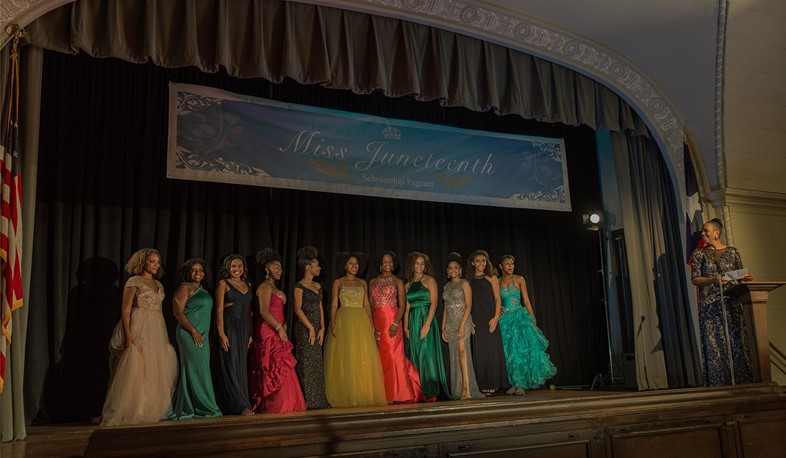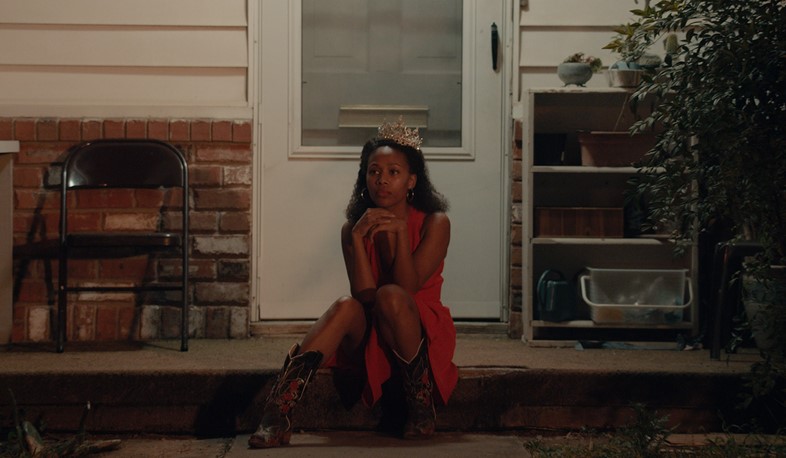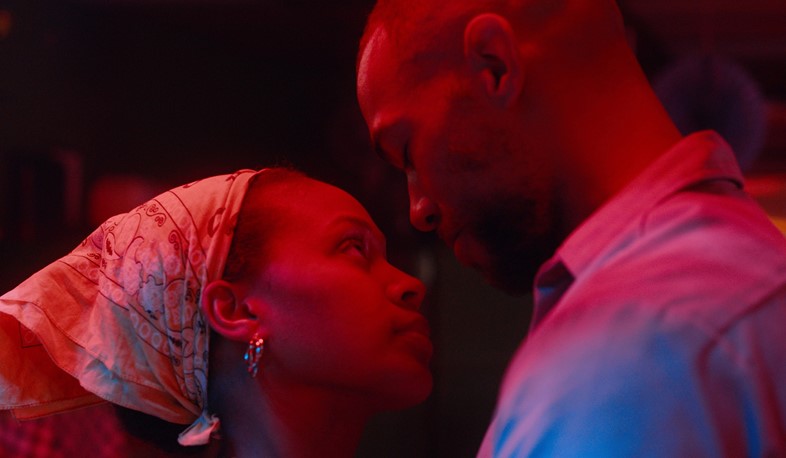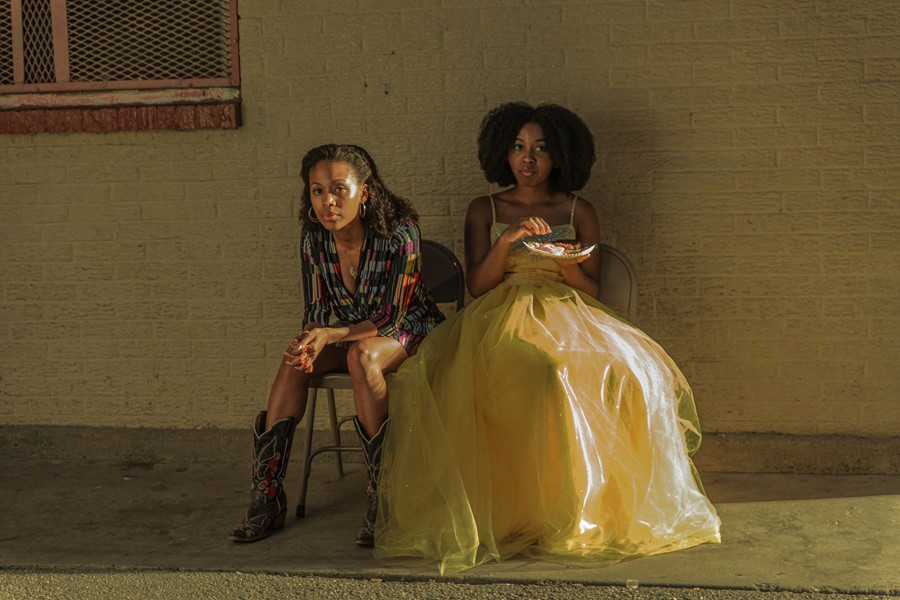“It’s important for me as a Black woman to see more of us both in front of and behind the camera”: writer-director Channing Godfrey Peoples speaks to Sagal Mohammed on her debut feature film, Miss Juneteenth
The acclaimed debut of Texan writer-director Channing Godfrey Peoples, Miss Juneteenth tells the story of Turquoise, a job-juggling single mother and former beauty pageant queen whose dream is for her 14-year-old daughter to wear the crown she once wore and seize the opportunities that come with it, as she couldn’t.
Set in Peoples’ own hometown, Fort Worth, Texas, the film acts as a love letter to the community she grew up in, the people in it and their remarkable stride. Maya Angelou’s Phenomenal Woman soundtracks the narrative as ‘Turq’, who desperately wants the world for her little girl, works tirelessly to prepare her for the Miss Juneteenth pageant despite her reluctance to participate. The competition is at the centre of Juneteenth, the annual celebration of the day the enslaved people in Texas discovered they were free on June 19, 1865 – two whole years after President Lincoln’s Emancipation Proclamation.
Peoples, who premiered the feature at this year’s Sundance Film Festival, weaves in numerous themes to showcase the many layers of strength, resilience and poise within the Black community. She walks us through the loving yet often frustrating co-dependency of Turq and Kai’s relationship as mother and daughter, while also making space to spotlight the multitude of ways in which Turq is a pillar in her community. Despite her own struggles, she’s constantly making sacrifices for others: be it giving up the $400 she saved up for Kai’s dress to bail her estranged husband out of jail, or swallowing her pride to show up for her disapproving mother when she’s found drunk at a bar. The film also explores the threats of gentrification and Black ownership in a white man’s world. “Ain’t no American dream for Black folks,” proclaims one of the characters half-way through the 120-minute feature – a message that seems as relevant today as it did 400 years ago.
Here, Peoples tells AnOther about her inspirations for the film, her personal connection to the Miss Juneteenth pageant and what it meant for its release to coincide with the height of the Black Lives Matter movement.

Sagal Mohammed: Congrats on your feature film debut. You’re from Fort Worth too, how much of your own reality and community was Miss Juneteenth inspired by?
Channing Godfrey Peoples: All of it. It’s not an autobiographical film but it really was written around the community in which I grew up and Turquoise as a character was inspired by many of the women that I admired growing up. The inspiration is incredibly close to home, it’s from my mum, my grandmothers and my aunts, so there’s much of myself in Turquoise. One of the things I noticed about the folks in my community is this sense of determination that they had, there was also this grit about them but many of them also carry themselves with grace. So, once I started thinking about what I wanted my first feature film to be about, I was like ‘well those are the people that really inspire me’, and I wanted to see them on-screen.
SM: One of my favourite things about the film is the space you allow to showcase the experience of a Black woman. We get to see a few different sides to Turquoise, she’s not just a struggling mother with two jobs, you also celebrate the fun and tender sides of her relationship with her daughter, her mother and the men in her life. How important was it for you to show that?
CGP: I knew that I wanted to tell a story about a Black woman with a dream deferred that just knows that she wants something for herself, even if she can’t articulate it fully in the moment, although we get to a point in the film where she can. I think now I realise that that alone is radical in a way because these stories are far and few between. Turquoise has these hopes and dreams for her child to have a better life but in pursuing that hope, she must find a way to reconcile her own dreams.
As I mentioned, I grew up with Black women around me that I admired in so many ways and was inspired by. When I think about the kind of stories I want to tell, those stories are near and dear to my heart. It is especially important for me as a Black woman to see more of us both in front of and behind the camera.

SM: The relationship between Turquoise and Kai, particularly Turquoise’s desperation for her to achieve all the things she couldn’t is something many people, especially Black women or anyone from an immigrant family, will be able to relate to. Have you ever felt that kind of pressure?
CGP: Yes, I think that’s what makes the film so relatable. Many of us have a story that we can connect it to in which our parents wanted us to have a better life. Growing up – my mother was single for much of my life – I think a big part of what inspired me as well is that as a kid, I was watching her trying to find a way to reconcile her own dreams while raising children and wanting her own children to have a better future, so I think that was my advantage point initially.
An interesting fact is along the way, like right before I was about to make the film, I became a mum myself. So, I ended up navigating some of those same emotions that Turquoise is navigating in the film because I had a daughter and I instantly had my own fears. I was like ‘wow, there is this beautiful child I’m responsible for now and I want to find a way to create the best future for her’. But in real time, I was also experiencing this bond with this little human being that I had never experienced before, and it gave me this sense of joy. So, there were definitely things that informed the film in real time that I was experiencing in my life for the first time.
SM: Juneteenth is a holiday commemorating the emancipation of slaves, and the events of this year have called for it to become wider celebrated within the States. What are your thoughts on that?
CGP: Juneteenth has always been second nature to me, it was so much a part of the fabric of my life. Just for anyone who is unfamiliar, Juneteenth commemorates the day enslaved people in Texas found out that they were free. Sadly, that was almost two and a half years after the Emancipation Proclamation. Their freedom was kept hidden from them intentionally, so we commemorate it in Texas on June 19 of every year with parades, Blues music, BBQs and there’s dance, and someone is always going to sing Lift Every Voice and Sing which is the Black national anthem. Then the centre-piece of it is the Miss Juneteenth pageant. It’s a scholastic beauty pageant for young Black women to gain college scholarship as you see in the film and it really is a way that the community can invest in these young women’s futures. It’s something that I’ve always seen, I remember going to the openings for Miss Juneteenth and I’d see these beautiful young Black women who would float out on stage. It was so formative for me. It was confidence building because I got to see these young women who looked like me. For me, it was my version of Miss America and something I really wanted to see on-screen.

SM: What was it like having the movie released during the height of the Black Lives Matter movement?
CGP: It was bittersweet in a way because while I was grateful that the film was going out into the world, at the same time, we’re in the midst of a pandemic and we were also in the US navigating yet another national tragedy in which people were having conversations about Black Lives Matter. Personally, as a Black woman in America, these things are happening outside your door. It took all our breaths away but many of the conversations and the things that were being navigated in the film are conversations that we’ve been having in the Black community for as long as I can remember. People were saying the film was so timely but we’ve literally been having these conversations my whole life. But I was still glad to see somewhat of a national awareness of being able to listen to Black folks and hear our voices, not just in cinema but on the ground, the activists that have been doing the work forever. Then at the same time, it still shakes you every time you see what happens with Breonna Taylor and George Floyd and that these things keep happening over and over. As a Black person, it’s so disheartening and painful to see.
SM: The importance of Black ownership is another theme in the movie. Here in the UK, there was recently something called Black Pound Day introduced to support Black businesses. How important do you think this is in uplifting Black communities and why?
CGP: I think it’s interesting because as an artist I’m always wanting to share authenticity and in this community in particular, it’s a close-knit Black community. Fort Worth is actually the 14th biggest city in the US but in the film it feels like a small country town – that’s because it’s so tight knit. I grew up with that small-town feel because everyone knows everyone and there’s a sense of pride in this community, not just within the people themselves but in business. There’s a couple of businesses that you see in the film that are owned by my real family friends like the bar, the funeral home and I can just remember those particular businesses being passed down through generations between families. It was really about legacy. People were really making a choice to keep these businesses no matter what because the neighbourhood was being gentrified. I think Black ownership is really important not just for this story but for our community to have this sense of pride.
SM: The film really highlights how much of a backbone Black women are in their community. We see Turquoise supporting her estranged husband and her mother who is suffering with alcoholism, even though she’s struggling herself. It made me think of this long-standing narrative of Black women always being the protectors but never the protected. What are your thoughts on that?
CGP: I love being a Black woman and I hope everyone can see that from the film itself. I was inspired by so many Black women and I wanted to see them on-screen. As a filmmaker I’m just constantly mirroring what I see in society and Black women, we make such strides. There are campaigns out there saying listen to Black women but it’s interesting that we even have to say that, that’s obvious. I had an upbringing in which I saw forward-thinking Black women. My family made history available to me and I think that’s important, I just have such a great respect for us and I want to continue to be able to tell stories where we’re at the forefront.
SM: Finally, what’s the main thing you want people to take away from Miss Juneteenth?
CGP: I try not to be heavy handed and my hope is that people find something that resonates for them in the film. If I had any wish it would be that people leave with some sense of hopefulness after having seen the film. But I think there’s something particular that people can find within the film themselves, there are themes of freedom, what it means to parent and it’s a story about a mother and a daughter but Turquoise is obviously also navigating love and business, so I think that there is something for many of us and I hope people find something to connect to.
Miss Juneteenth screens in cinemas throughout the UK from September 25, 2020.
